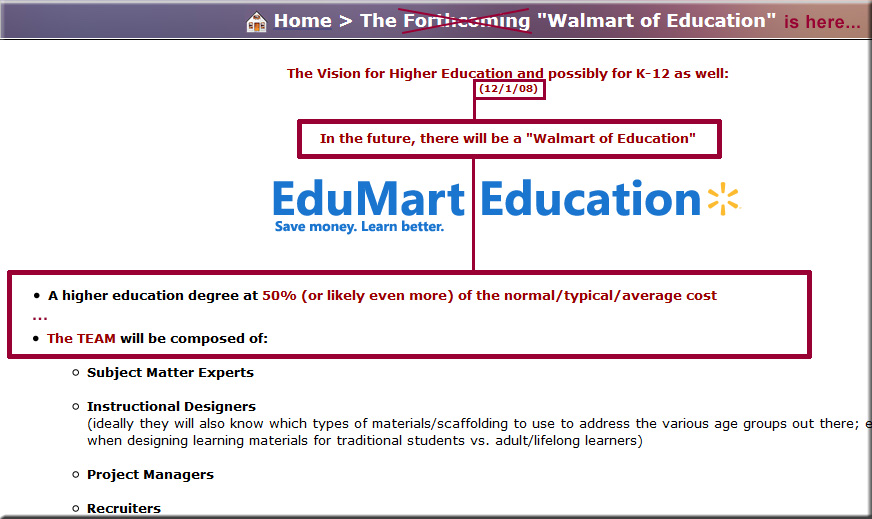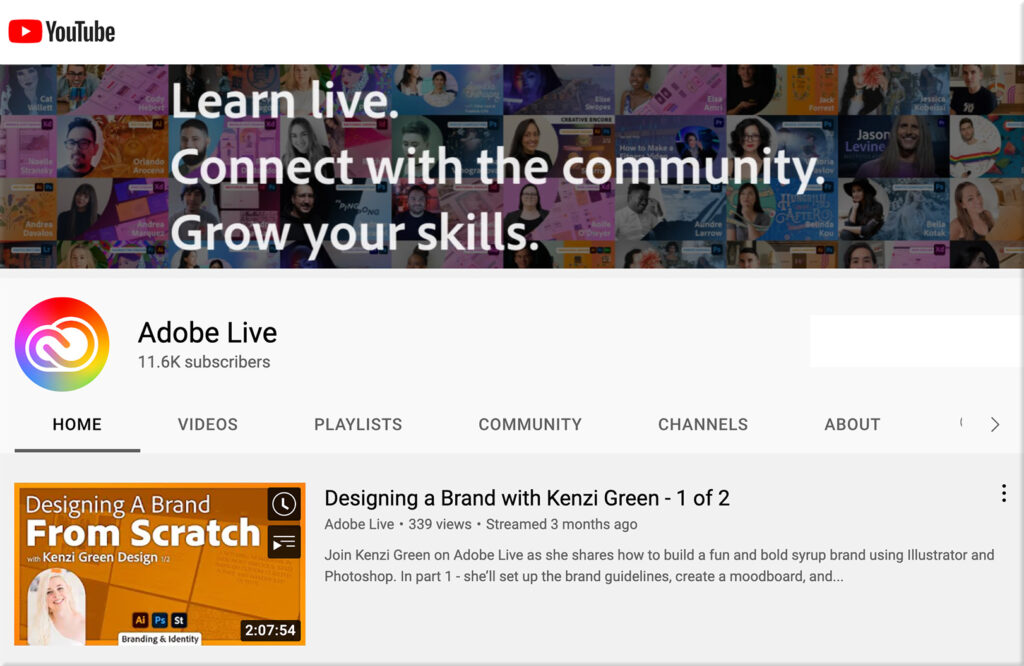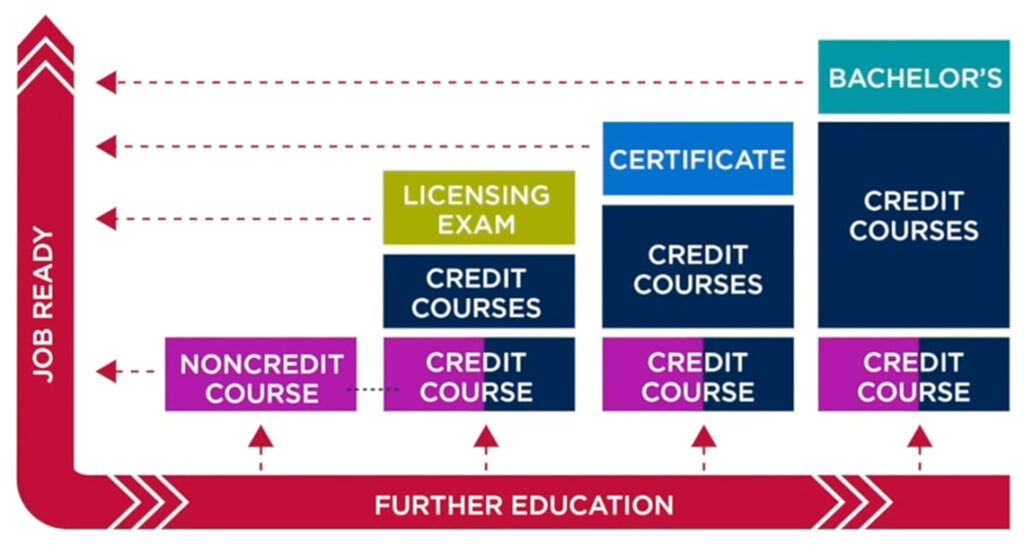DC: Is the future of one of our powerful learning ecosystems more like adding your own desired groups/cohorts, topics, items, etc. to your server? Like a learning-focused type of Discord service? (https://t.co/Vq4dZamBf2)#future #learningecosystems #personalizedlearning pic.twitter.com/wVMWYBN3R1
— Daniel Christian (he/him/his) (@dchristian5) August 17, 2023
From DSC:
Now you’re talking! A team-based effort to deliver an Associate’s Degree for 1/3 of the price! Plus a job-ready certificate from Google, IBM, or Salesforce. Nice.
Check these items out!
We started Outlier because we believe that students deserve better. So we worked from the ground up to create the best online college courses in the world, just for curious-minded learners like you.
The brightest instructors, available on-demand. Interactive materials backed by cognitive science. Flexible timing. And that’s just the beginning.
Outlier.org
MasterClass’s Co-Founder Takes on the Community-College Degree — from wsj.com by Lindsay Ellis
A new, online-only education model promises associate degrees via prerecorded lectures from experts at Yale, NASA and other prestigious institutions
Excerpts (emphasis DSC):
One of the founders of the celebrity-fueled, e-learning platform MasterClass is applying the same approach to the humble community-college degree—one based on virtual, highly produced lectures from experts at prestigious institutions around the country.
…
The two-year degrees—offered in applied computing, liberal studies or business administration—will be issued by Golden Gate University, a nonprofit institution in San Francisco. Golden Gate faculty and staff, not the lecturers, will be the ones to hold office hours, moderate virtual discussions and grade homework, said Outlier, which is announcing the program Wednesday and plans to start courses in the spring.
Golden Gate University and Outlier.org Reinvent Affordable College with Degrees+ — from prnewswire.com
Excerpt:
For less than one-third the price of the national average college tuition, students will earn an associate degree plus a job-ready certificate from Google, IBM, or Salesforce
NEW YORK, Sept. 7, 2022 /PRNewswire/ — Golden Gate University is launching Degrees+, powered by Outlier.org, with three associate degrees that reimagine the two-year degree for a rising generation of students that demand high quality education without the crushing cost. For annual tuition of $4,470 all-inclusive, students will earn a two-year degree that uniquely brings together the best of a college education with a career-relevant industry certificate.
Beginning today, students can apply to be part of the first class, which starts in Spring 2023.
“Imagine if everyone had the option to go to college with top instructors from Harvard, Yale, Google, and NASA via the highest-quality online classes. By upgrading the two-year degree, we can massively reduce student debt and set students up for success, whether that’s transferring into a four-year degree or going straight into their careers.”
Aaron Rasmussen, CEO and founder of Outlier.org
and co-founder of MasterClass
Outlier.org & Universities Call for Greater Credit Transfer Transparency — from articles.outliner.org
Excerpt:
“Outlier.org is working with leading institutions across the country to build a new kind of on-ramp to higher education,” said Aaron Rasmussen, CEO and Founder of Outlier.org. “By partnering with schools to build bridges from our courses into their degree programs, we can help students reduce the cost of their education and graduate faster.”
From DSC:
All of this reminds me of a vision I put out on my Calvin-based website at the time (To His Glory! was the name of the website.) The vision was originally called “The Forthcoming Walmart of Education” — which I renamed to “EduMart Education.”
By the way…because I’m not crazy about Walmart, I’m not crazy about that name. In today’s terms, it might be better called the new “Amazon.com of Higher Education” or something along those lines. But you get the idea. Lower prices due to new business models.
.

Dead Malls and Future Campuses — from insidehighered.com by Joshua Kim
Thoughts on Meet Me by the Fountain: An Inside History of the Mall.
Excerpt:
Can we learn anything about the future of the university from the history of the shopping mall?
If any lessons connecting malls to colleges are to be found, the starting place is Meet Me by the Fountain. It is hard to imagine a more complete social, architectural, cultural, economic or cross-national comparison of shopping malls than this book provides.
For some, all the detail, theorizing and analysis of the mall’s history, relevancy and meaning might be a bit too much. For those looking for clues about how the university might evolve post-pandemic, the deep dive into malls that Meet Me by the Fountain provides is helpful.
Facebook Seems to Be Adding Video-Course Features. For Edtech, That Raises Old Fears. — from edsurge.com by Daniel Mollenkamp
Excerpts:
The tech giant Meta, widely known under its previous name Facebook, seems to be eyeing a way to allow users to offer video classes.
Since at least last year, Meta has experimented with Facebook Classes, a program designed to make online instruction through its platform smoother. A consultant recently noticed a company announcement about the features in the U.K. version of the platform and shared a screenshot on Twitter.
New! Facebook Classes for Events
‘Classes’ is new event type which can be selected when creating a new online event on Facebook.
It aims to make it easier to instruct and discover a class on Facebook pic.twitter.com/L0BvBuTXkM
— Matt Navarra (@MattNavarra) January 21, 2021
The company did not respond to questions about the program. But recent reports have speculated that the company could “bootstrap an online course ecosystem.”
Meta’s learning offering could be most trouble for other tech behemoths like Google Classroom and Microsoft Teams, according to some speculations.
Either way, Meta’s possible entrance into the market plays into a long-standing fear of big tech in the edtech industry.
‘Stackable credentials’ could be future of higher education in Colorado — from thedenverchannel.com by Nicole Brady; with thanks to Ray Schroeder for this resource out on LinkedIn
Excerpt (emphasis DSC):
DENVER — Metropolitan State University of Denver is one of Colorado’s largest four-year institutions, but some students are spending just months there — not years — before joining the workforce.
They’re doing it by “stacking” credentials.
“Stackable credentials are really a convergence of individuals wanting to learn in smaller chunks and industries being willing to accept those chunks,” said Terry Bower, associate vice president of Innovative and Lifelong Learning at MSU Denver.
The career launchpad lays out exactly what steps are needed to work in those industries and how much money a person can earn with different credentials.
For students who decide they want to add more credentials or work toward a degree, they can return to MSU with no credits lost.
From DSC:
That part that says “The career launchpad lays out exactly what steps are needed to work in those industries and how much money a person can earn with different credentials” will likely be a part of a next-generation learning platform. Here are the skills in demand. Here are the folks offering you the ability to learn/develop those skills and here’s what you can expect to earn at different levels of this type of job. The platform will be able to offer this type of information and these types of opportunities throughout your lifetime.
Cloud-based learner profiles will be part of this new setup — along with recommendation engine-based results based upon one’s learning preferences (not learning styles — which don’t exist — but upon one’s learning preferences).
From DSC:
After seeing the item below, I thought, “Hmmm…traditional institutions of higher education better look out if alternatives continue to gain momentum.” Perhaps it’s wise to double down on efforts to gather feedback from students, families, parents, businesses, and other stakeholders in the workplace regarding what they want and need — vs. what the faculty members of institution ABC want to teach.
A Third of U.S. College Students Consider Withdrawing — from news.gallup.com by Stephanie Marken
Excerpt:
Editor’s Note: The research below was conducted in partnership between the Lumina Foundation and Gallup.
About a third (32%) of currently enrolled students pursuing a bachelor’s degree report they have considered withdrawing from their program for a semester or more in the past six months. A slightly higher percentage of students pursuing their associate degree, 41%, report they have considered stopping out in the past six months. These are similar to 2020 levels when 33% of bachelor’s degree students reported they had considered stopping out and 38% of associate degree students said the same.










![The Living [Class] Room -- by Daniel Christian -- July 2012 -- a second device used in conjunction with a Smart/Connected TV](http://danielschristian.com/learning-ecosystems/wp-content/uploads/2012/07/The-Living-Class-Room-Daniel-S-Christian-July-2012.jpg)




